The World Health Organization (WHO) declared a rare victory Monday: Nigeria is free of Ebola following its months-long battle against the fatal disease.
Nigeria’s containment of Ebola is a “spectacular success story,” WHO’s director for Nigeria, Rui Gama Vaz, told a news conference in the capital, Abuja.
Lagos, Nigeria
The disease came to Lagos, Africa’s most populous city, through airline passenger Patrick Sawyer who carried Ebola from Liberia to Nigeria. The July 23 announcement about the disease hitting Nigeria “rocked public health communities all around the world,” the WHO said in a statement.
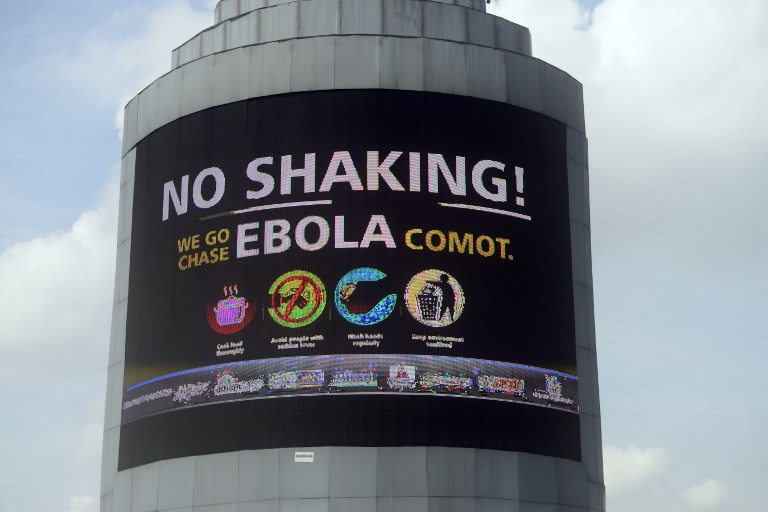
A picture taken in Oshodi Heritage park in Lagos on Oct. 20, 2014 shows an electronic information board on Ebola reading in pidgin English “No Shaking! We go Chase Ebola Comot” which means “No cause for worry, we will chase Ebola away.” (Photo: AFP)
Many feared the worst in in an urban sprawl characterized by large populations living in crowded and unsanitary conditions in many slums.
“The last thing anyone in the world wants to hear is the two words, ‘Ebola’ and ‘Lagos,’ in the same sentence,” U.S. Consul General Jeffrey Hawkins noted at the time, saying the juxtaposition conjured up images of an “apocalyptic urban outbreak.”
Instead, with swift coordination between state and federal health officials, the WHO and the U.S. Centers for Disease Control — and with ample financial and material resources from Nigeria’s government — isolation wards were immediately constructed and later designated Ebola as treatment centers.
Health officials reached every single known person to have contact with infected people in Lagos.
Port Harcourt, Nigeria
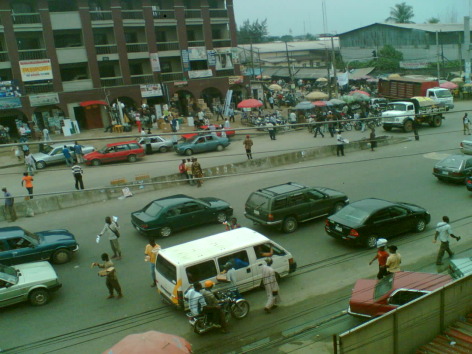
A major junction along the Port Harcourt-Aba Express Road (Photo via Wikimedia Commons)
Meanwhile, officials have reached 99.8 percent of infected people in Port Harcourt, Nigeria’s oil capital.
The disease was carried there by infected Nigerian diplomat Olubukun Koye, an official for the Economic Community of West African States (ECOWAS).
The Aftermath
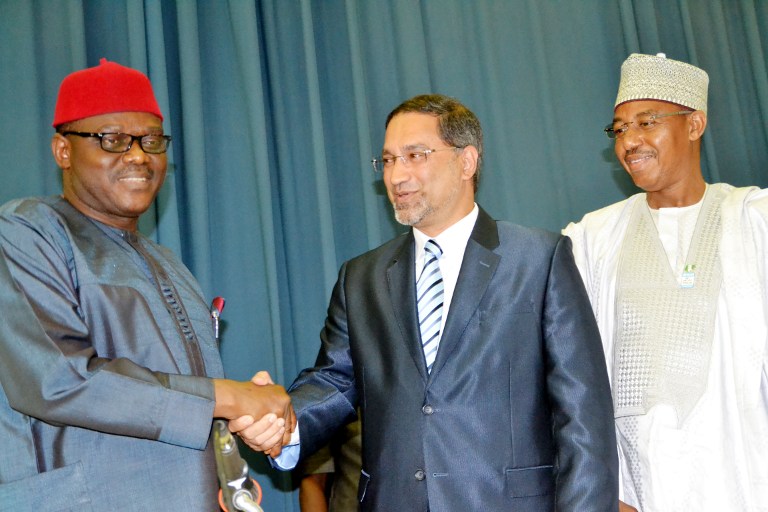
Rui Gama Vaz (C), World Health Organization’s representative, congratulates Nigeria’s Minister of Health Professor Onyebuchi Chukwu (L) while Minister of State for
Health Dr Haliru Alhassan looks on during a press conference in Abuja. (Photo: AFP)
With 18,500 visits to 894 contacts, health workers tracked the progress of all who had come in contact with the disease. In the end, Nigeria suffered 20 cases of Ebola and eight deaths, including two doctors and a nurse.
Monday’s announcement comes after 42 days had passed since the last case in Nigeria tested negative. This is twice the disease’s maximum incubation period.
“The outbreak in Nigeria has been contained,” Vaz said. “But we must be clear that we only won a battle. The war will only end when West Africa is also declared free of Ebola.”
Vaz warned that Nigeria’s geographical position and extensive borders makes the country, Africa’s most populous of some 160 million people, vulnerable to additional imported cases of Ebola. Nigerian officials are checking for such dangers at land, air and sea borders.
“We must remain vigilant,” said Hussaini Abdu, Nigeria country director for the charity ActionAid. “Ebola is a highly dangerous virus and we must stay alert to any signs of new infections so that we can respond quickly and effectively.”
The disease continues to spread rapidly in Liberia, Sierra Leone and Guinea and has claimed more than 4,500 lives.
Containing Ebola: What you need to know
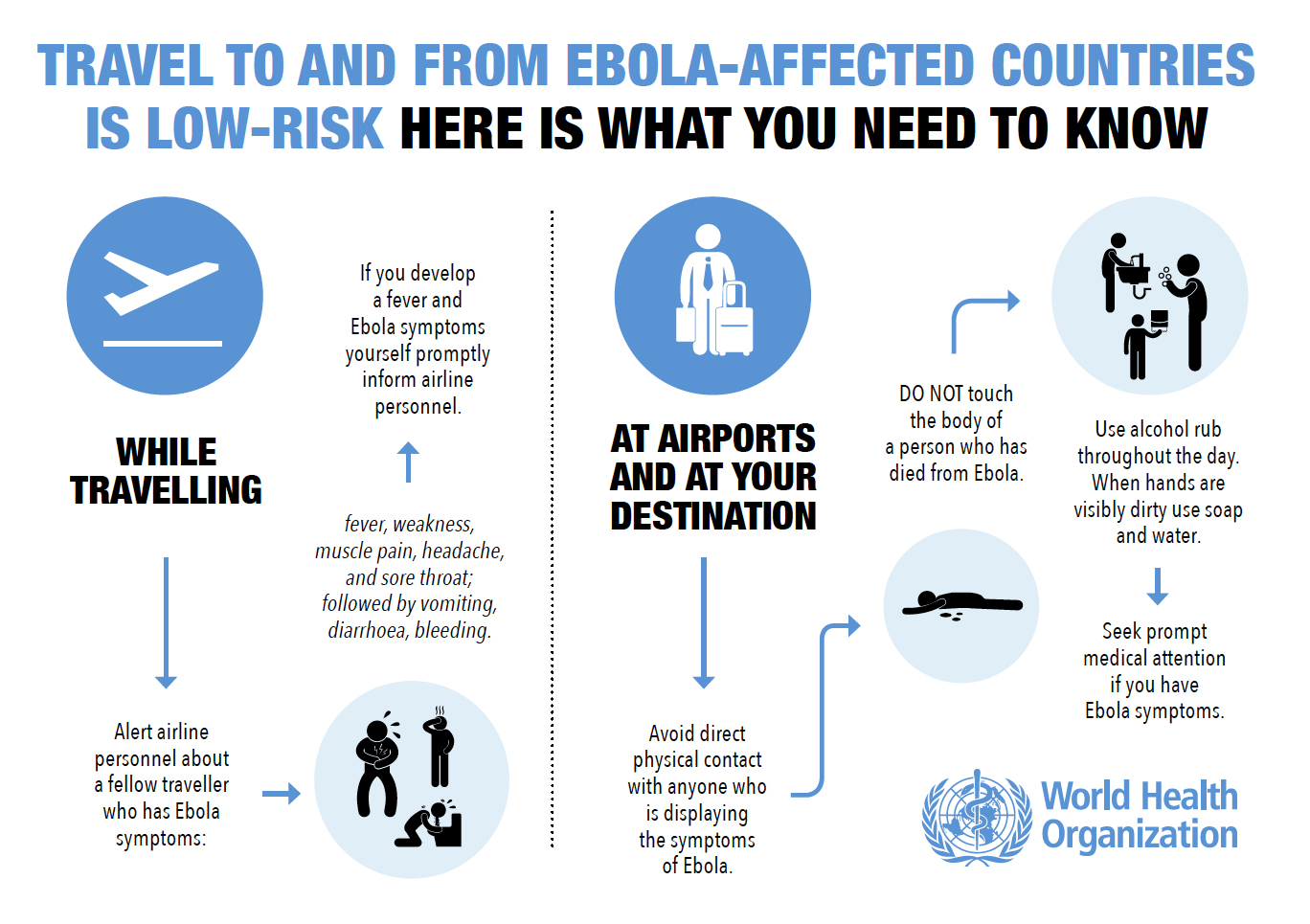
This story was compiled with information from the Associated Press and World Health Organization.
Israel is the latest country to step-up screening efforts against Ebola. On Sunday the country’s health ministry announced all passengers arriving to Israel from Africa are being screened for the deadly virus that has already claimed thousands of lives. CCTV America’s Stephanie Freid reports from Israel’s international airport.

China has contributed $6 million to the United Nations World Food Program’s emergency operation. The funds will help 1.3 million people impacted by the Ebola virus outbreak in the three most-affected countries of Guinea, Liberia and Sierra Leone. The goal is to prevent a health crisis from becoming a food crisis. CCTV’s Su Yuting reports.

Liberia remains one of the worst-affected countries when it comes to Ebola. The virus is affecting every aspect of society. CCTV America’s Katerina Vittozzi reports.

For more on the Ebola epidemic and the worldwide effort to contain it. CCTV America talked with Stephen Morrison. He is a global health policy expert and the senior vice president and director of global health policy at the Center for Strategic and International Studies.

Three months to the day after the first Ebola patient arrived in Nigeria, the outbreak there is over. CCTV America’s Jim Spellman reports.

A special Ebola summit was held in Cuba on Monday involving heads of state from the ALBA group of Latin American and Caribbean countries. It’s the first regional meeting aimed at coordinating plans for protecting these countries from Ebola as well as seeking ways to help West Africa. CCTV America’s Michael Voss reports from Havana.

For an in-depth look at how Ebola and other issues are impacting Africa’s economies, CCTV America is joined by David Evans, World Bank Senior Economist for the Africa region.

 CGTN America
CGTN America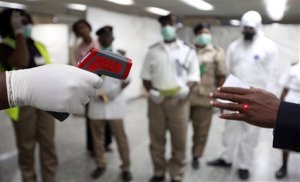 In this Monday, Aug. 4, 2014, file photo, a Nigerian health official uses a thermometer on a worker at the arrivals hall of Murtala Muhammed International Airport in Lagos, Nigeria. Ebola has killed more than 4,500 people in West Africa and wreaked havoc on the region, but some Africans see a bright side: The virus has been limited to five countries. It has even been beaten back in two of those countries. (AP Photo/Sunday Alamba, File)
In this Monday, Aug. 4, 2014, file photo, a Nigerian health official uses a thermometer on a worker at the arrivals hall of Murtala Muhammed International Airport in Lagos, Nigeria. Ebola has killed more than 4,500 people in West Africa and wreaked havoc on the region, but some Africans see a bright side: The virus has been limited to five countries. It has even been beaten back in two of those countries. (AP Photo/Sunday Alamba, File)
